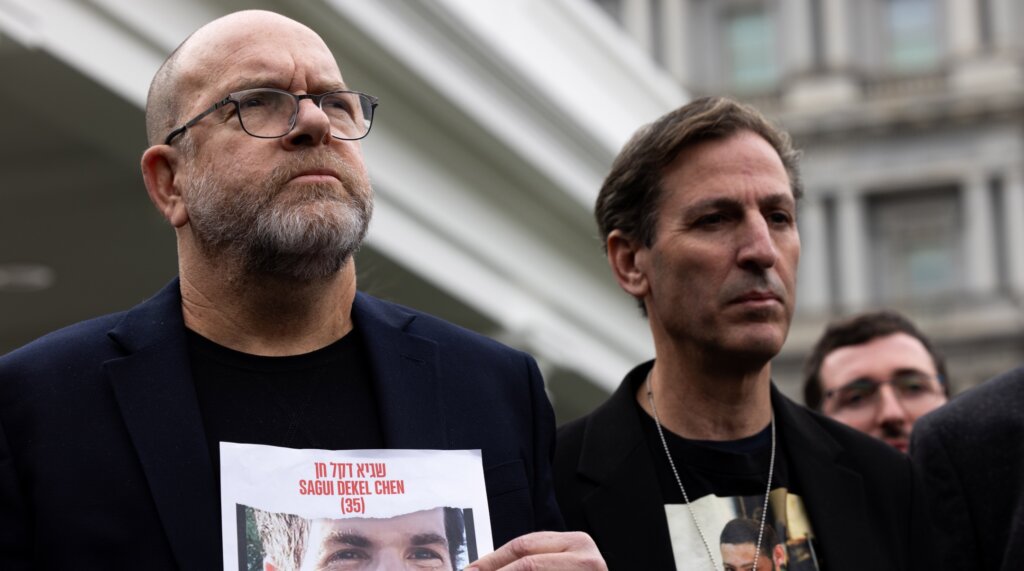Netanyahu throws cold water on hostage deal prospects, and reminds us what a curse he is for Israel
Here are the two sad reasons Netanyahu wants a forever war

Israeli Prime Minister Benjamin Netanyahu in a still from The Bibi Files. Courtesy of Courtesy Marlene Meyerson JCC/Other Israel Film Festival
In Israel, there was recently growing hope of an imminent hostage deal that would free the 100-plus hostages held by Hamas — many of whom are presumed dead — and end the war in Gaza, as I wrote last week. Then Prime Minister Benjamin Netanyahu gave an interview to The Wall Street Journal and shattered those hopes, declaring any deal would be partial, and the war would grind on.
He tried to make this point of view seem logical. But there is a growing sense among Israelis that something is actually terribly amiss, and that Netanyahu is actively prolonging the war in Gaza to buy yet more time for himself in power, because ending the war would collapse his coalition.
It is depressing to even contemplate, and sounds unbearably cynical, yet there’s basically no other way to explain what’s going on.
The implication is heartbreaking: That Netanyahu, desperate to cling to power through a megalomania hitherto unknown in Israel, is prioritizing political survival over the lives of hostages, soldiers, and civilians on both sides of the conflict. No previous leader of Israel was capable of such immorality; I’ve personally met almost all of them since the 1980s, and I am sure of it. About Netanyahu, who I’ve interviewed three times, I am not so sure at all.
This assessment does not absolve Hamas, whose catastrophic decision to invade Israel on Oct. 7, 2023, was an act of barbaric evil. That day’s atrocities — mass murder, kidnappings, and inhuman terrorism against civilians — reflect a level of cruelty that short-circuits people’s minds. Hamas’ leaders, indifferent to the suffering of their own people, gambled on a path that caused Israel harm but brought Gaza to absolute ruin. If Hamas coughed up the hostages and stood down, the war would stop, despite Netanyahu.
But while Hamas bears ultimate responsibility, Israel’s response has been hijacked by Netanyahu’s self-serving agenda. Rather than working toward a coherent endgame that ensures security, fairness and stability, Netanyahu has engineered a “forever war,” leveraging the crisis to delay political and legal reckonings over his government’s catastrophic failures on Oct. 7.
There were grounds to believe the optimism coming out of circles close to the negotiation, since it seemed that Israeli successes in the broader war compelled Hamas to ease its demand for an Israeli pullout from Gaza, even in the first of several stages. Polls show that more than 70% of Israelis want to end the war and get the hostages back. Gaza, perhaps even right-wingers feel, had been punished enough.

But like clockwork, as he has done every time in the past year when optimism blossomed, Netanyahu appeared to pour cold water on these hopes. In his interview, he explained that any deal would be a partial one in exchange for a pause in the fighting. “I’m not going to agree to end the war before we remove Hamas,” he said.
Sounds reasonable, no? Who wants to leave Hamas in power? I’m sure the civilians of Gaza most certainly do not! So why has Israel not yet removed Hamas?
Because of Israel.
Israel’s war strategy is not currently aimed at crushing what remains of Hamas. The military has settled in for a long stay and is playing cat-and-mouse with what has become an insurrection. It enters a neighborhood — like Deir-al-Ballah, say — and then exits, each time allowing Hamas back in. This could go on for years.
Why would anyone want this? Because Netanyahu’s coalition is controlled by far-right factions that want eternal occupation, Jewish settlement of Gaza, and perhaps schemes to compel the Palestinians to leave. Such a future would devastate Israel and leave it isolated — but these fanatics do not care for practicalities, any more than does Hamas.
The only feasible outcome
From the beginning it was clear that the only feasible post-Hamas arrangement would be a return of the Palestinian Authority, which now runs the West Bank autonomy zones, back to Gaza, from which Hamas expelled it in 2007 by force. Israel itself once yearned for this, back when rational people governed the country. The proposals pushed by President Joe Biden for more than a year now envision versions of this, with the PA rejuvenated and assisted by Arab and perhaps other forces.
An Israel that wanted this would have ensured that Hamas is out of the way, publicly and persistently offering its remaining troops exile. Arab pressure on the group would have been overpowering. Israel would possibly get peace with Saudi Arabia as part of the bargain.
Instead, Netanyahu’s goons flooded the airwaves arguing that Israel cannot pull out of Gaza and end the war because Hamas would regain power. But by blocking PA involvement, and through the military tactics now in place, Netanyahu has ensured that Hamas would regain power if Israel does leave. This cynical setup allows him to continue the war indefinitely, with devastating consequences for all involved.
“The government says only ‘no,’ to what it doesn’t want. I haven’t yet heard it say ‘yes,’ about what it actually proposes,” said Ruby Chen, whose son Itay’s body is believed to be held by Hamas, on Sunday. “The number one task now is not destroying Hamas but bringing back the hostages. I don’t think there’s one person who’d disagree.”

He’s wrong about that last point. Almost a third of Israelis appear ready to basically buy anything Netanyahu is selling. A talented populist can work with that level of support. That’s why Netanyahu is able to condemn hostages — and more soldiers and Palestinians — to a needless death.
But why does he insist on such a path? Well, there are two reasons.
First, Netanyahu’s government needs the war to go on because it enables them to argue that as long as there’s a war, there cannot be an accounting for the unprecedented debacle of Oct. 7. Had a different government been in place, Netanyahu would have had his supporters setting the streets on fire demanding that the government resign. As things stand, he has been blocking an inquiry commission, which in Israel’s system had been hitherto de rigueur after even much smaller failings — never mind the deadliest day for Jews since the Holocaust. Netanyahu’s proxies are arguing that the commission would inevitably be political, and their solution is to appoint a transparently political government commission. Basically, Netanyahu needs time to pass, so memories fade.
Second, Netanyahu needs to stay in power in order to continue abusing his office to engineer delays in his bribery trial. Last week, he convinced the judges to put off his testimony so he could visit the troops and record a video in the Golan Heights. This is a tactic he has used ever since the corruption charges surfaced some seven years ago, and he can be expected to continue dragging out the proceedings for years.
Gadi Eizenkot, the reserve general who headed the military during much of the 2010s, and was in Netanyahu’s cabinet for the first seven months of the war, last month stated plainly that Netanyahu was prolonging the war for political reasons and accused him of “near-criminal behavior.”
Netanyahu is betting on his ability to sell even a partial hostage release as a victory — and so soldier on, doing his best to undermine the judiciary, clinging to power by any machination conceivable, indifferent to the devastation he leaves behind.
Israel, a nation with extraordinary military, scientific, and economic capabilities, finds itself unable to conjure the political imagination needed to move past Netanyahu’s corrupt and dysfunctional leadership. As the Jewish people approach Hanukkah, a holiday commemorating an ancient miracle, many Israelis are yearning for a contemporary miracle as well — or a deus ex machina that rids them of this cabal.
A message from our Publisher & CEO Rachel Fishman Feddersen

I hope you appreciated this article. Before you go, I’d like to ask you to please support the Forward’s award-winning, nonprofit journalism so that we can be prepared for whatever news 2025 brings.
At a time when other newsrooms are closing or cutting back, the Forward has removed its paywall and invested additional resources to report on the ground from Israel and around the U.S. on the impact of the war, rising antisemitism and polarized discourse.
Readers like you make it all possible. Support our work by becoming a Forward Member and connect with our journalism and your community.
— Rachel Fishman Feddersen, Publisher and CEO






















